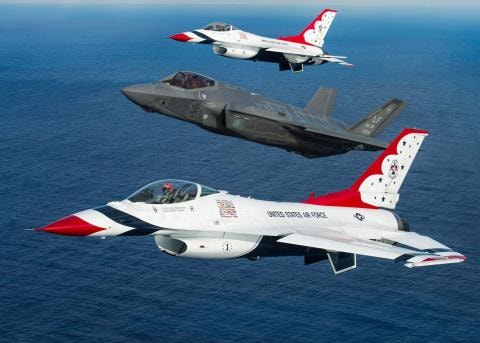Customer caught F-35 sending classified information to the US
RT has just revealed shocking information that Norway has discovered that its F-35s have been secretly sending confidential information directly to the manufacturer in the US.
The source said that the Norwegian Air Force has now received 3 out of a total of 40 F-35 fighters ordered from contractor Lockheed Martin.
According to Norway's F-35 program director, Major General Morten Klevar, the aircraft is an important element in the modernization of the armed forces and demonstrates the ability to protect national interests and allies.
However, for some reason, Norwegian authorities recently discovered that F-35 fighters were secretly transferring a large amount of sensitive information to the manufacturer Lockheed Martin's servers in Texas after each flight, regardless of training or combat exercises.
 |
| F-35 fighter (center). |
"Every country that uses the F-35 needs to filter the information that the aircraft is transmitting back to the manufacturer," Norwegian Defense Ministry advisor Lars Gjemble said, but did not specify what sensitive information the country discovered.
Before this shocking information was made public, according to Flightglobal, a series of US allied countries expressed concern that with its special automatic information processing system, the F-35 could become a spy for the US.
The source said that the current software system on the F-35 allows recording all operations of the pilot and aircraft, as well as information on the survival index of the equipment. After landing and connecting to the logistics management system, all this information is automatically analyzed and then transferred to the Lockheed Martin server system.
The issue that makes countries buying F-35s especially concerned is that in addition to information about the technical condition of the equipment, a lot of special information related to combat operations and flight information is also transmitted to the US. The above information processing system is known as ALIS.
Faced with this situation, customers who ordered the F-35 said that collecting information related to military aviation could affect their national security. To reassure US allies, Lockheed Martin affirmed that the problem would be solved by developing a "firewall" system called Sovereign Data Gateway - SDG between the F-35 aircraft and the ALIS server system in Texas.
According to the manufacturer, information about the F-35 aircraft will be processed by SDG. That is, military experts in the host country can intervene to delete information related to military secrets, before this information is transferred to the ALIS server in the US.
However, some military strategists believe that the ALIS system is currently considered the biggest flaw in the F-35 fighter jet line that Lockheed Martin has yet to find a way to fix. The problems with ALIS are putting the 2,500 F-35 aircraft at risk of not being able to fly in the sky, CNN quoted the US Air Force.
ALIS, which the Pentagon has dubbed the F-35's "brain," is a large, complex system that encompasses the entire maintenance and repair support supply chain, including the computing equipment needed to ensure components are properly installed before takeoff.
According to veteran defense commentator Zachary Cohen, the current problem lies in the lack of a testing system to ensure the F-35's software works smoothly when these aircraft have been equipped with the US Air Force and some customers since late 2016.
The US Marine Corps has announced plans to upgrade and address software issues in its fleet of F-35s, which have been operational since July 2015. However, the US Government Accountability Office (GAO) said there is no guarantee that the software will be completed before 2019.
Unlike aircraft hardware such as wings or engines, control software is installed on computers located at command centers to support combat operations, maintenance, and repair...
The GAO found that the US Department of Defense did not have a plan to ensure that the above software system would operate smoothly and on time so that the F-35 could be mass produced. This is a common requirement for all weapons programs to ensure that these devices operate stably and have a reliable logistical support system.
If these software problems are not resolved, the entire fleet of fifth-generation super fighters will be "shelved," the GAO warned. To resolve these emerging technical issues, the GAO estimates that an additional investment of $20-100 billion will be needed.
TBaodatviet pig
| RELATED NEWS |
|---|

